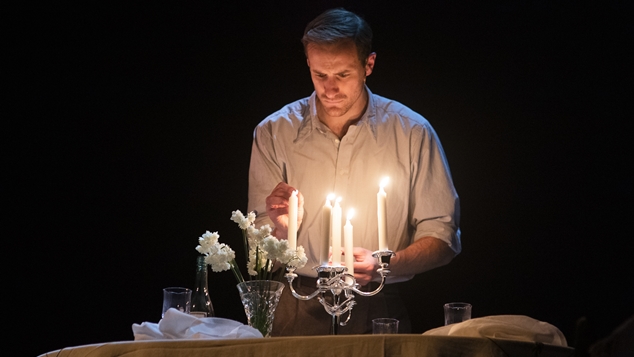
The Glass Menagerie | His Majesty’s Theatre | til 21 Aug | ★ ★ ★ ★
The Glass Menagerie is a semi-autobiographical work by playwright and poet Tennessee Williams set in late 1930s America. Memory play is a term coined by Williams to describe the style of this work as the story is narrated by one of the characters. All events from the work are drawn from the characters memory, where Tom Wingfield directly addresses the audience and interweaves himself throughout the story being told. Joined on stage by Perth jazz pianist Tom O’Halloran, the work is accompanied by the grand piano.
Set in the Wingfield’s family home, we see inside the house of Amanda Wingfield as the rooms are separated by semi sheer screens and projected lighting. Up on a slight rise is their dining room where much of the work takes place. Being able to see into numerous rooms at once allowed the audience into the minds of multiple characters which really made me feel like I was in the room with them.
The sets and costumes were of Williams’ era, with the beautiful, dark wood antique furniture and framed doorways welcomed the audience into the world of the Wingfield family home. Costume Designer Fiona Bruce explores the concept of memory and escapism through the setting, transforming the world on stage through lighting design, video projection and sound composition. Throughout the work, phrases and images are projected onto the sheer screen that creates the walls of the home in Michael Carmody’s video design. While all the references and cues which get projected are drawn directly from the text, I found they simplified the themes and symbolism of the Wingfield’s world in a way that didn’t quite match the rest of the performance. The text often projected fragmented words and phrases which gave us insight into Laura’s fear and fragility however this almost felt unnecessary, as Daken’s performance was so readable.
Tom O’Halloran sits at the piano in the back half of the stage, silhouetted behind the semitransparent curtain of the living room wall. Reflecting the happenings of the script, O’Halloran worked with the cast to improvise on piano throughout rehearsals to create a structured yet still improvised accompaniment. O’Halloran’s composition embodies a variety of sounds and techniques, from manually strumming the piano strings, to jarring, atonal passages, light flourishing motifs, to snippets from Schubert’s Ave Maria. While at first the balance between piano and ensemble was lacking, by scene two, the sound and balance carried throughout His Majesty’s Theatre perfectly.
The audience is swept up in the inner workings of the dysfunctional Wingfield family from the moment it begins. Joel Jackson opens the play in the role of Amanda’s son Tom Wingfield who’s been forced into to the role of family breadwinner after his father’s disappearance. Frustrated by familial expectations, it’s clear that Tom has bigger dreams than working close to home and yearns for a more vibrant life. Jackson gave a heartfelt performance in the role and did a superb job narrating throughout.
In the role of family matriarch Amanda Wingfield, Mandy McElhinney’s plays the well-intentioned steam roller of a mother. In Act II we see a giggly, flirty McElhinney, fantasizing about her socialite heydays injecting light and comedy into the scene. McElhinney’s interpretation is coloured by a fierceness and confidence that embodies her characters’ passion and imposing ways.
In the role of Amanda’s daughter Laura, Acacia Daken brings a fragile authenticity to the role in her Black Swan State Theatre Company debut. Daken’s performance embodied the fragility of someone with physical and mental trauma with absolute believability; her inner conflict and the crippling nature of her anxiety from PTSD was palpable. In an interview with Magazine 6000, Daken sheds light on her experience of living with an invisible disability; “for our interpretation of her physicality, we have chosen to draw on my own experience and acknowledge the physical care and discomfort someone with an ongoing physical impairment has as they navigate their day-to-day life and the exhaustion of that”. Daken carries the audience into her imagination inviting us into the inner world of safety and friendship she has with her glass animals.
In Act II we’re introduced to Laura’s love interest and Tom’s mate Jim O’Connor played by Jake Fryer Hornsby. Hornsby has a gentle and graceful stage presence which complimented the rest of the ensemble brilliantly.
Directed by Clare Watson, Black Swan State Theatre Company’s production of The Glass Menagerie highlights the universal themes of family, acceptance, and deception. With a star-studded cast, this is a must see for all theatre lovers.
Claira Prider, images: Daniel J Grant
You can support our work by subscribing to our Patreon
or contributing to our GoFundMe campaign.






